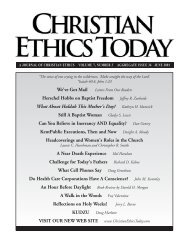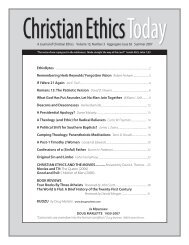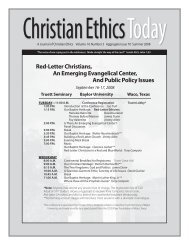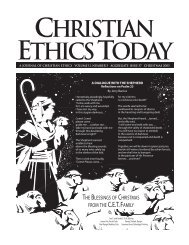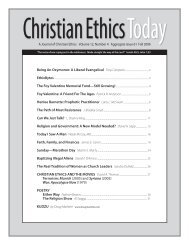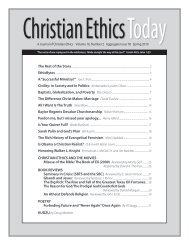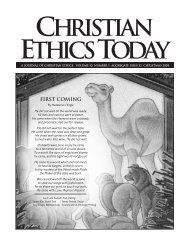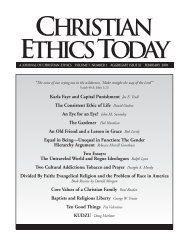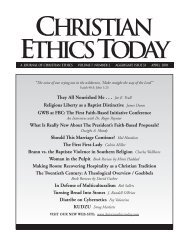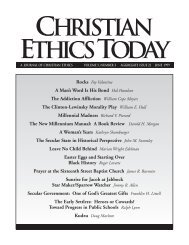Issue 048 PDF Version - Christian Ethics Today
Issue 048 PDF Version - Christian Ethics Today
Issue 048 PDF Version - Christian Ethics Today
You also want an ePaper? Increase the reach of your titles
YUMPU automatically turns print PDFs into web optimized ePapers that Google loves.
theological dimensions bear heavily on the prophet and issue<br />
forth in laments that reveal the personal dimension of conflict.<br />
In viewing the personal dimension of Jeremiah’s lament<br />
we better understand the nature of the wound incurable<br />
these laments describe.<br />
An overriding theme of lament in general and of the<br />
laments of Jeremiah in particular is that the suffering lamented<br />
is unjust. Jeremiah insists that he does not deserve the<br />
treatment he receives. His opponents are “those who deal<br />
treacherously” with him (12:1), not justly. “Should good be<br />
repaid with evil?” he asks God, contrasting his beneficent<br />
ministry of proclamation and prayer to the evil plans devised<br />
by his antagonists (18:20). Jeremiah has acted with integrity<br />
toward others: “I have neither lent, nor have men lent money<br />
to me, yet everyone curses me” (15:10). He has done nothing<br />
that merits contempt, though contempt is what he gets.<br />
If anyone should understand that Jeremiah is getting the<br />
shaft, it should be God. God is the one who knows and tries<br />
the prophet’s heart (12:3). Jeremiah has responded faithfully<br />
to the prophetic task; and while not delighting in proclaiming<br />
a word of judgment and destruction, Jeremiah has nevertheless<br />
fulfilled his responsibilities in ways fully open to<br />
divine review (17:16). Indeed, God knows that it is precisely<br />
because of Jeremiah’s faithfulness and integrity that he suffers<br />
insult and disgrace. If God’s focus has wandered, Jeremiah is<br />
bold enough in his innocence to reclaim God’s attention:<br />
“Thou who knowest, O LORD . . . know that for Thy sake I<br />
endure reproach” (15:15). These are not the words of someone<br />
attempting to discover where he went wrong in his ministry.<br />
Jeremiah insists that he faces treatment that he does not<br />
deserve.<br />
Along with protestations of innocence, we also see in the<br />
laments a prophet totally immersed in his calling. His conflict<br />
is so fully embracing because Jeremiah is fully embraced<br />
by his task. Jeremiah knows that he has been called from<br />
birth to the prophetic role (1:4-5), a call that could be avoided<br />
only if he had never been born (20:14-18). To be called<br />
from birth means that there is no Jeremiah apart from his<br />
role as a prophet.<br />
But since his calling is to proclaim an insistent word that<br />
meets only with stubborn resistance, he is immersed not only<br />
in his role as a prophet, but in conflict as well. Indeed, he sees<br />
his life as defined by conflict. His mother bore him “as a man<br />
of strife and a man of contention to all the land” (15:10). As<br />
far as Jeremiah is concerned, he came forth from the womb,<br />
not only as a prophet, but also “to look upon trouble and sorrow,<br />
so that my days have been spent in shame” (20:18). So<br />
identified with his task is Jeremiah that the fate of the<br />
word—reproach and derision—is the fate of the prophet.<br />
Will Willimon cites the wisdom once given a group of<br />
ministers. “You don’t have to be courageous as a preacher. All<br />
you have to do is get down behind the text. You can say,<br />
‘This is not necessarily me saying this—but I do think the<br />
text says it.’” 15 Jeremiah was not afforded this luxury. There is<br />
no distance between Jeremiah and the word preached—no<br />
gap between prophet and message. For Jeremiah the word<br />
22 • FEBRUARY 2004 • CHRISTIAN ETHICS TODAY<br />
preached has become as part of him as his evening meal<br />
(15:16). Jeremiah is fully immersed in a prophetic task that<br />
places him between an insistent God and a resistant people.<br />
Because of this immersion, he suffers an incurable wound.<br />
Further, the space between God and people is a lonely<br />
one. Jeremiah is immersed in a task that brings him isolation.<br />
Davidson suggests we should expect nothing else for such a<br />
prophet: “You do not openly attack the temple . . . and get<br />
invited to the priests’ fraternal; you do not walk through the<br />
streets of Jerusalem advocating desertion to the enemy and<br />
then go for a drink in the officers’ mess.” 16 But Jeremiah’s isolation<br />
is more than just the end result of an abrasive message.<br />
It is not just occasional; it is vocational.<br />
Called by God to avoid all the normal activities of village<br />
life (e.g., marriage) as an indication of the end of normalcy<br />
for Judah (16:1-9), Jeremiah complains, “Because of Thy<br />
hand I sat alone, for Thou didst fill me with indignation”<br />
(15:17). His isolation is a feature of his immersion in his<br />
message. The prophet’s life correlates with the prophetic<br />
word. If God has become estranged from Israel, as a husband<br />
divorced from his wife (3:1) or as a stranger in the land<br />
(14:8), Jeremiah’s life “was shaped in such a way as to conform<br />
to the shape of the life of God toward Israel at this particular<br />
moment.” 17 His isolation stems directly from a call<br />
that claimed his entire existence.<br />
Jeremiah complains of an incurable wound and ceaseless<br />
pain (15:18). What are his injuries? A prophet offers a burdensome<br />
but truthful word to a people who respond with<br />
fierce antagonism. In the face of undeserved suffering that<br />
consumes his life he feels God has failed to sustain and<br />
uphold him in the task. Thorough immersion in his task<br />
means personal embodiment of a word of anguish and travail.<br />
His ministry has left him lonely and isolated, cut off<br />
from family and friend. And, most disturbing of all, even<br />
though God is fully aware of his situation and hears his<br />
prayers, Jeremiah struggles with whether or not God offers<br />
any resolution to his trouble. The social, theological, and<br />
personal dimensions of Jeremiah’s complaints reveal what<br />
Berrigan calls “a trinity of anguish and lamentation.” 18 Is<br />
there any palliative care for the ceaseless pain of a conflicted<br />
prophet? Does it even make sense to speak of a remedy for an<br />
incurable wound?<br />
As bitter as are these laments, though, and as shattered of a<br />
man as these laments reveal, one of the last scenes we have<br />
from the Book of Jeremiah concerning the prophet is of<br />
someone still faithful to his task, still a person of prayer, still<br />
someone of conviction and courage, and still a prophet unalterably<br />
committed to the will of God (chapter 42). How do<br />
we get from “O Lord, you have deceived me and I was<br />
deceived” (20:7) to the life of on-going faithfulness and service?<br />
By what means did Jeremiah endure his incurable<br />
wound? But first, what remedies were forbidden?<br />
James Dittes observes, “There are two ways to swallow<br />
grief dumbly, both ways making it more poisonous than<br />
nutritious. One can deny the life that was lived . . . or one<br />
can deny the death. . . . The minister can swallow grief either



